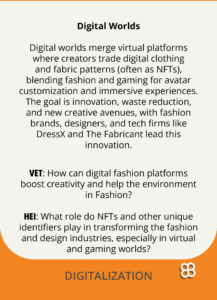Digital Worlds refer to virtual environments or online platforms where fashion-related experiences, interactions, and transactions take place. These digital worlds leverage technology to create immersive and interactive experiences that bridge the gap between physical and virtual fashion realms.
Digital Worlds encompass various aspects within the fashion industry, including virtual fashion shows, digital showrooms, e-commerce platforms, augmented reality (AR) and virtual reality (VR) experiences, social media platforms, and fashion-focused mobile applications. These digital platforms and technologies enable brands, designers, retailers, and users to engage with fashion in innovative and dynamic ways.
In digital worlds, virtual fashion shows allow designers to showcase their collections to a global audience without the limitations of physical space. Through live streaming or pre-recorded presentations, viewers can experience the excitement of runway shows from the comfort of their own screens. Digital showrooms provide a virtual space for buyers, retailers, and industry professionals to explore and order fashion products, eliminating the need for physical showroom visits.
E-commerce platforms play a significant role in digital worlds, offering users the convenience of online shopping for fashion items. These platforms provide detailed product information, high-resolution images, and secure payment options, enabling users to browse and purchase fashion products from anywhere, anytime. Augmented reality (AR) and virtual reality (VR) experiences in digital worlds bring fashion to life in virtual environments.
Users can virtually try on clothes, accessories, and makeup, visualize how different outfits would look on them, and even interact with virtual fashion models or avatars. Social media platforms play a pivotal role in connecting fashion brands, influencers, and usmers.
Users can follow their favorite fashion brands, discover new trends, share their own style, and engage in fashion-related discussions. Social media platforms also facilitate direct communication between brands and users, enabling feedback, brand loyalty, and community building.
Fashion-focused mobile applications offer personalized experiences, styling recommendations, and fashion-related content. These apps allow users to create virtual wardrobes, receive fashion inspiration, and access exclusive promotions and discounts.
In summary, digital worlds encompass virtual environments, online platforms, and technologies that enable immersive, interactive, and innovative fashion experiences. They provide opportunities for designers, brands, retailers, and users to engage, connect, and participate in the digital landscape of fashion.
Case studies
Burberry
Burberry is a renowned luxury fashion brand that has embraced digital innovation. In 2010, Burberry launched its “Retail Theater” concept, which combined physical and digital elements. The brand incorporated live streaming of runway shows, interactive digital displays in stores, and real-time social media integration to create an immersive and connected experience for customers.
Gucci
Gucci, a leading luxury fashion brand, has embraced augmented reality (AR) technology to enhance customer engagement. In 2019, Gucci launched an AR-powered app called “Gucci Sneaker Garage” that allowed users to virtually try on and customize sneakers. The app utilized AR to overlay virtual shoes onto the user’s feet, providing an interactive and personalized experience.
Zara
Zara, a popular fast-fashion brand, has leveraged digital worlds through its mobile application. The Zara app offers features like augmented reality (AR) shopping, where users can point their phone’s camera at designated spots in stores or displays to view additional product information, styling suggestions, and even models wearing the clothes virtually.
Farfetch
Farfetch is an online luxury fashion retailer that has integrated digital worlds into its platform. The company offers virtual try-on features, allowing customers to virtually try on selected items using augmented reality (AR) technology. Customers can see how the clothes would fit and look on themselves before making a purchase decision.
The Fabricant
The Fabricant is a digital fashion house that creates virtual fashion garments and experiences. They specialize in creating 3D digital fashion pieces that exist only in the digital realm. The Fabricant collaborates with various fashion brands and designers to create virtual collections and immersive digital experiences.
References
Specialist, A. M. B. (2023, January 4). Metaverse and fashion: A relationship for Success. Evergine. https://evergine.com/metaverse-fashion/
Akhtar, Waleed Hassan, et al. “A New Perspective on the Textile and Apparel Industry in the Digital Transformation Era.” Textiles 2.4 (2022): 633-656.
Sayem, Abu Sadat Muhammad. “Digital fashion innovations for the real world and metaverse.” International Journal of Fashion Design, Technology and Education 15.2 (2022): 139-141.
Gornostaeva, Galina. “The development of digital commerce in the fashion industry: The typology of emerging designers in London.” Technological Forecasting and Social Change 186 (2023): 122122.
